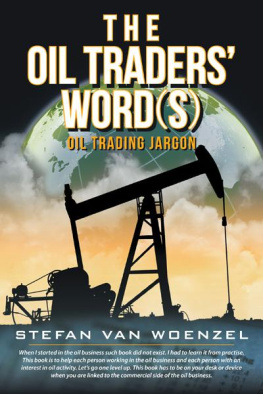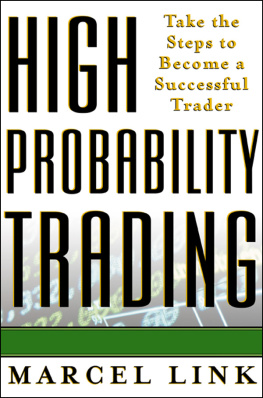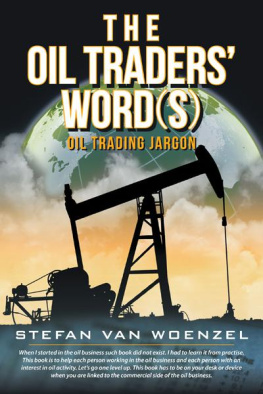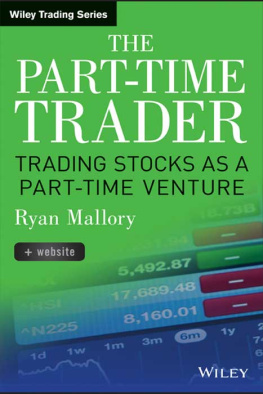Stefan van Woenzel - The Oil Traders’ Word(S): Oil Trading Jargon
Here you can read online Stefan van Woenzel - The Oil Traders’ Word(S): Oil Trading Jargon full text of the book (entire story) in english for free. Download pdf and epub, get meaning, cover and reviews about this ebook. year: 2012, publisher: AuthorHouseUK, genre: Home and family. Description of the work, (preface) as well as reviews are available. Best literature library LitArk.com created for fans of good reading and offers a wide selection of genres:
Romance novel
Science fiction
Adventure
Detective
Science
History
Home and family
Prose
Art
Politics
Computer
Non-fiction
Religion
Business
Children
Humor
Choose a favorite category and find really read worthwhile books. Enjoy immersion in the world of imagination, feel the emotions of the characters or learn something new for yourself, make an fascinating discovery.
- Book:The Oil Traders’ Word(S): Oil Trading Jargon
- Author:
- Publisher:AuthorHouseUK
- Genre:
- Year:2012
- Rating:4 / 5
- Favourites:Add to favourites
- Your mark:
- 80
- 1
- 2
- 3
- 4
- 5
The Oil Traders’ Word(S): Oil Trading Jargon: summary, description and annotation
We offer to read an annotation, description, summary or preface (depends on what the author of the book "The Oil Traders’ Word(S): Oil Trading Jargon" wrote himself). If you haven't found the necessary information about the book — write in the comments, we will try to find it.
The Oil Traders’ Word(S): Oil Trading Jargon — read online for free the complete book (whole text) full work
Below is the text of the book, divided by pages. System saving the place of the last page read, allows you to conveniently read the book "The Oil Traders’ Word(S): Oil Trading Jargon" online for free, without having to search again every time where you left off. Put a bookmark, and you can go to the page where you finished reading at any time.
Font size:
Interval:
Bookmark:
The
Oil Traders Word(s)
Oil Trading Jargon
Stefan van Woenzel

AuthorHouse
1663 Liberty Drive
Bloomington, IN 47403
www.authorhouse.com
Phone: 1-800-839-8640
2012 by Stefan van Woenzel. All rights reserved.
No part of this book may be reproduced, stored in a retrieval system, or transmitted by any means without the written permission of the author.
Published by AuthorHouse 06/08/2012
ISBN: 978-1-4685-8604-6 (sc)
ISBN: 978-1-4685-8603-9 (hc)
ISBN: 978-1-4685-8605-3 (e)
Any people depicted in stock imagery provided by Thinkstock are models, and such images are being used for illustrative purposes only.
Certain stock imagery Thinkstock.
Because of the dynamic nature of the Internet, any web addresses or links contained in this book may have changed since publication and may no longer be valid. The views expressed in this work are solely those of the author and do not necessarily reflect the views of the publisher, and the publisher hereby disclaims any responsibility for them.
Contents
This book is written based on the authors 25 years of experience in the oil market. This book is not meant to be used as a scientific piece of documentation connected to commercial oil contracts and other commercial and operational decisions in the oil business. For that purpose the reader and/or user of this book may utilize the content of this book at his own risk.
The book is meant as a guide in oil trading language. It is the authors best effort to help explain to understand the oil traders business talk to the people working in oil related business.
The author does not have a master degree in oil trading and therefore the content is based on the authors interpretation of oil talk and the authors dedication to oil trading and logistics. Therefore any commercial risk resulting from the use of this book is to the reader or user of this book.
By this the reader and/or user of this book has been warned twice.
It is the readers and users own responsibility to read or not to read this warning before using or reading this book.
The Oil Traders Words are always important to listen to and to understand in a good matter.
The oil trader, as I describe it, is a person who is actively trading physical oil cargoes. That trader is responsible for buying oil cargoes, selling oil cargoes and hedging his position with as target to secure a certain income for the company he is working for. In my view that is the traders core business. But the experience and knowledge to create that business requires much more than the trade only. There is so much activity in trading going on. It is about refining, blending, logistic optimization and much more. A trader has to know his market and that means that he needs a lot of information and a good network. Such a network is not easily built when he is sitting watching a screen. Travelling, participation in conferences or workshops, wining and dining and business meetings are part of the job. It is important that the trader can move away from his desk when needed. A colleague trader has to be able to cover the market, guarding the open positions in the meantime. The trader is part of the market and therefore he has to be visible and present himself as representative for the company he is working for. New market information might lead to further growth, new business, confirmation of a market view or a complete change of opinion. In the meantime the major companies come up with more and more rules related to trading, risk management, credit handling, counterparty checks, HSE and all kind of different company requirements. With the current economic circumstances in our world those rules make a lot of sense. Money, HSE and reputation is at risk all the time. Reputation and the way, related to ethical behaviour, how a company makes money is important. The activity of the trader in a major oil company can easily create more than a billion Dollars cash flow per year per trader. As a trader is able and has the mandate to deal with that much money (sum of all traded cargoes) every person working in an oil trading environment just has to understand what the trader is talking about, as you may be connected to that amount of money.
If you work in the oil business then the main question you need to ask yourself is: Do I understand traders jargon? Many people starting in oil trading, working in risk departments and in back office positions hear the trader talking about their business activity and positions. And when you hear all those discussions where traders jargon is used then you will get used to the words even without knowing what those words mean. You forget to ask questions like what do you mean and maybe some think they look dumb asking too many questions. So as a result of that you will just agree with the trader as that is the easy way out. Therefore the most common way to act is to listen to the oil traders decision and agree, because he probably knows best. However, I am sure that most people know what their responsibility is. I believe that lots of people work on auto-pilot. Understanding the job is what makes a day at work an exciting day. Success always starts with good communication. But communication works only when business is clear and understood. Ask your children when they read a book about the meaning of certain words. There are many words which children can read but do not understand. It works in the same way for adults. Ask your colleagues if they understand the words structure, forward market, backwardation or contango. These examples are basic words in the oil business but still difficult for many people to understand. But many people use the words without knowing how business works.
When I started my career in oil logistics I did not know anything about the oil business. I could speak English and German, and apparently I was a nice guy because I got a job in oil logistics at Van Ommeren, which is now known as Vopak. My first job was to nominate a barge to load naphtha from a tank at a terminal with Germany as destination. It was easy to say yes and then enter an order in the computer and send a fax to a loading master at the storage terminal, as that was the job I had to do. I wanted to know more about the business. What is naphtha, what is a tank and what is a barge? I started to learn the logistics and finally I got good at it. Ship documents landed on my desk and I always went through them, curious as I was and still am.
Then after 10 years in storage I got a job offered with Statoil in Norway. I started in operations but very soon after that I started trading gasoline. Due to my logistic background I had at least something to lean on, but soon I found out that trading knowledge is much different from operations. I heard other traders talk about their activity and I agreed all the time and in case I had a problem I asked the experienced traders, who replied to me in a way which at those days I did not understood. So again I had to learn and pick up the trading terms and again I got good at it, because I am always curious and interested to keep learning.
Now after more than 25 years in the oil business I can call myself reasonable experienced and I use an awful lot of trading jargon. I used a language which is rich of all type of popular trading terms. Experienced traders know what they are talking about and everybody always agree with the big trader. Sometimes I get a question and then I give an answer which is loaded with trading terms and after the discussions I assume that I answered in a clear way.
It made me thinking and I remembered the way how I started. I remembered also that there were no complete glossaries around with oil trading terms. So therefore I started to collect each oil-trading-related word I heard and wrote them down. Then I got to the point that not many other new words got added to my list. So it became time to put them in an alphabetic order. It was a hell of a job, close to 1000 words is what I collected in a word-file. Due to those many pages I got the idea to share my collection in a book. The first book was published in July 2010 and since then more and more words were still added in my file. I have also been looking around on websites of different companies and by using LinkedIn I got even more words and expressions which I could add to my book. The book content is now doubled since 2010 and it became a real complete overview of oil business related words. This second edition of the book contains close to 2000 different definitions and I am proud of it. I am sure this book will be a valuable book for many people in the oil business.
Next pageFont size:
Interval:
Bookmark:
Similar books «The Oil Traders’ Word(S): Oil Trading Jargon»
Look at similar books to The Oil Traders’ Word(S): Oil Trading Jargon. We have selected literature similar in name and meaning in the hope of providing readers with more options to find new, interesting, not yet read works.
Discussion, reviews of the book The Oil Traders’ Word(S): Oil Trading Jargon and just readers' own opinions. Leave your comments, write what you think about the work, its meaning or the main characters. Specify what exactly you liked and what you didn't like, and why you think so.






![Ryan Mallory [Ryan Mallory] - The Part-Time Trader: Trading Stock as a Part-Time Venture, + Website](/uploads/posts/book/124134/thumbs/ryan-mallory-ryan-mallory-the-part-time-trader.jpg)
